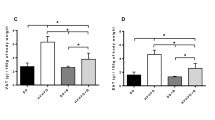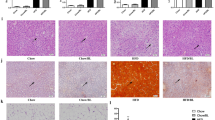Abstract
Obesity is a global health threat that causes various complications such as type 2 diabetes and nonalcoholic fatty liver disease. Gut microbiota is closely related to obesity. In particular, a higher Firmicutes to Bacteroidetes ratio has been reported as a biomarker of obesity, suggesting that the phylum Bacteroidetes may play a role in inhibiting obesity. Indeed, the genus Bacteroides was enriched in the healthy subjects based on metagenome analysis. In this study, we determined the effects of Bacteroides stercoris KGMB02265, a species belonging to the phylum Bacteroidetes, on obesity both in vitro and in vivo. The cell-free supernatant of B. stercoris KGMB02265 inhibited lipid accumulation in 3T3-L1 preadipocytes, in which the expression of adipogenic marker genes was repressed. In vivo study showed that the oral administration of B. stercoris KGMB02265 substantially reduced body weight and fat weight in high-fat diet induced obesity in mice. Furthermore, obese mice orally administered with B. stercoris KGMB02265 restored glucose sensitivity and reduced leptin and triglyceride levels. Taken together, our study reveals that B. stercoris KGMB02265 has anti-obesity activity and suggests that it may be a promising candidate for treating obesity.




Similar content being viewed by others
Data availability
All data generated or analysed during this study are included in this published article and its supplementary information files.
References
Ashrafian F et al (2021) Extracellular vesicles and pasteurized cells derived from Akkermansia muciniphila protect against high-fat induced obesity in mice. Microb Cell Fact 20:219. https://doi.org/10.1186/s12934-021-01709-w
Avgerinos KI, Spyrou N, Mantzoros CS, Dalamaga M (2019) Obesity and cancer risk: emerging biological mechanisms and perspectives. Metabolism 92:121–135. https://doi.org/10.1016/j.metabol.2018.11.001
Bakir-Gungor B, Bulut O, Jabeer A, Nalbantoglu OU, Yousef M (2021) Discovering potential taxonomic biomarkers of type 2 diabetes from human gut microbiota via different feature selection methods. Front Microbiol 12:628426. https://doi.org/10.3389/fmicb.2021.628426
Centers for Disease Control and Prevention (2021) Adult obesity facts. Available from https://www.cdc.gov/obesity/data/adult.html. Accessed 24 Aug 2023
Chen G et al (2018) Kudingcha and Fuzhuan brick tea prevent obesity and modulate gut microbiota in high-fat diet fed mice. Mol Nutr Food Res 62:e1700485. https://doi.org/10.1002/mnfr.201700485
Cho SH, Cho YJ, Park JH (2022) The human symbiont Bacteroides thetaiotaomicron promotes diet-induced obesity by regulating host lipid metabolism. J Microbiol 60:118–127. https://doi.org/10.1007/s12275-022-1614-1
Considine RV et al (1996) Serum immunoreactive-leptin concentrations in normal-weight and obese humans. N Engl J Med 334:292–295. https://doi.org/10.1056/NEJM199602013340503
de Groot P et al (2020) Donor metabolic characteristics drive effects of faecal microbiota transplantation on recipient insulin sensitivity, energy expenditure and intestinal transit time. Gut 69:502–512
den Besten G et al (2015) Short-chain fatty acids protect against high-fat diet-induced obesity via a PPARgamma-dependent switch from lipogenesis to fat oxidation. Diabetes 64:2398–2408. https://doi.org/10.2337/db14-1213
Despres JP, Lemieux I (2006) Abdominal obesity and metabolic syndrome. Nature 444:881–887. https://doi.org/10.1038/nature05488
Gauffin Cano P, Santacruz A, Moya A, Sanz Y (2012) Bacteroides uniformis CECT 7771 ameliorates metabolic and immunological dysfunction in mice with high-fat-diet induced obesity. PLoS ONE 7:e41079. https://doi.org/10.1371/journal.pone.0041079
Greenberg AS, Obin MS (2006) Obesity and the role of adipose tissue in inflammation and metabolism. Am J Clin Nutr 83:461S-465S. https://doi.org/10.1093/ajcn/83.2.461S
Grundy SM (2004) Obesity, metabolic syndrome, and cardiovascular disease. J Clin Endocrinol Metab 89:2595–2600. https://doi.org/10.1210/jc.2004-0372
Halford JC, Boyland EJ, Blundell JE, Kirkham TC, Harrold JA (2010) Pharmacological management of appetite expression in obesity. Nat Rev Endocrinol 6:255–269. https://doi.org/10.1038/nrendo.2010.19
Hamilton BS, Paglia D, Kwan AY, Deitel M (1995) Increased obese mRNA expression in omental fat cells from massively obese humans. Nat Med 1:953–956. https://doi.org/10.1038/nm0995-953
Henning SM et al (2018) Decaffeinated green and black tea polyphenols decrease weight gain and alter microbiome populations and function in diet-induced obese mice. Eur J Nutr 57:2759–2769. https://doi.org/10.1007/s00394-017-1542-8
Hollister LE, Overall JE, Snow HL (1967) Relationship of obesity to serum triglyceride, cholesterol, and uric acid, and to plasma-glucose levels. Am J Clin Nutr 20:777–782. https://doi.org/10.1093/ajcn/20.7.777
Koliada A et al (2017) Association between body mass index and firmicutes/bacteroidetes ratio in an adult Ukrainian population. BMC Microbiol 17:1–6
Kwok S et al (2020) Obesity: a critical risk factor in the COVID-19 pandemic. Clin Obes 10:e12403. https://doi.org/10.1111/cob.12403
Le Chatelier E et al (2013) Richness of human gut microbiome correlates with metabolic markers. Nature 500:541–546
Ley RE, Backhed F, Turnbaugh P, Lozupone CA, Knight RD, Gordon JI (2005) Obesity alters gut microbial ecology. Proc Natl Acad Sci U S A 102:11070–11075. https://doi.org/10.1073/pnas.0504978102
Ley RE, Turnbaugh PJ, Klein S, Gordon JI (2006) Microbial ecology: human gut microbes associated with obesity. Nature 444:1022–1023. https://doi.org/10.1038/4441022a
Obradovic M et al (2021) Leptin and obesity: role and clinical implication. Front Endocrinol (lausanne) 12:585887. https://doi.org/10.3389/fendo.2021.585887
Oh BS et al (2021) Cell-free supernatant of Odoribacter splanchnicus isolated from human feces exhibits anti-colorectal cancer activity. Front Microbiol 12:736343. https://doi.org/10.3389/fmicb.2021.736343
Palmnas-Bedard MSA et al (2022) The human gut microbiota and glucose metabolism: a scoping review of key bacteria and the potential role of SCFAs. Am J Clin Nutr 116:862–874. https://doi.org/10.1093/ajcn/nqac217
Park SS et al (2021) Latilactobacillus sakei WIKIM31 decelerates weight gain in high-fat diet-induced obese mice by modulating lipid metabolism and suppressing inflammation. J Microbiol Biotechnol 31:1568–1575. https://doi.org/10.4014/jmb.2107.07024
Rangwala SM, Lazar MA (2000) Transcriptional control of adipogenesis. Annu Rev Nutr 20:535–559. https://doi.org/10.1146/annurev.nutr.20.1.535
Reaven GM (1995) Pathophysiology of insulin resistance in human disease. Physiol Rev 75:473–486. https://doi.org/10.1152/physrev.1995.75.3.473
Reaven G (2004) The metabolic syndrome or the insulin resistance syndrome? Different names, different concepts, and different goals. Endocrinol Metab Clin North Am 33:283–303. https://doi.org/10.1016/j.ecl.2004.03.002
Ridaura VK et al (2013) Gut microbiota from twins discordant for obesity modulate metabolism in mice. Science 341:1241214. https://doi.org/10.1126/science.1241214
Riva A et al (2017) Pediatric obesity is associated with an altered gut microbiota and discordant shifts in F irmicutes populations. Environ Microbiol 19:95–105
Shen WD et al (2022) Gut microbiota accelerates obesity in peri-/post-menopausal women via Bacteroides fragilis and acetic acid. Int J Obes (Lond) 46:1918–1924. https://doi.org/10.1038/s41366-022-01137-9
Sung MM et al (2017) Improved glucose homeostasis in obese mice treated with resveratrol is associated with alterations in the gut microbiome. Diabetes 66:418–425
Tang QQ, Lane MD (2012) Adipogenesis: from stem cell to adipocyte. Annu Rev Biochem 81:715–736. https://doi.org/10.1146/annurev-biochem-052110-115718
Turnbaugh PJ, Ley RE, Mahowald MA, Magrini V, Mardis ER, Gordon JI (2006) An obesity-associated gut microbiome with increased capacity for energy harvest. Nature 444:1027–1031. https://doi.org/10.1038/nature05414
Verdam FJ et al (2013) Human intestinal microbiota composition is associated with local and systemic inflammation in obesity. Obesity 21:E607–E615
Yang JY et al (2017) Gut commensal Bacteroides acidifaciens prevents obesity and improves insulin sensitivity in mice. Mucosal Immunol 10:104–116. https://doi.org/10.1038/mi.2016.42
Yoon HS et al (2021) Akkermansia muciniphila secretes a glucagon-like peptide-1-inducing protein that improves glucose homeostasis and ameliorates metabolic disease in mice. Nat Microbiol 6:563–573
Yoshida N et al (2021) Bacteroides spp. promotes branched-chain amino acid catabolism in brown fat and inhibits obesity. iScience. https://doi.org/10.1016/j.isci.2021.103342
Funding
This work was supported by the Bio & Medical Technology Development program (NRF-2016M3A9F3947962 and NRF-2019M3A9F3065226) of the National Research Foundation of Korea (NRF) funded by the Ministry of Science and ICT (MSIT) of the Republic of Korea, and a grant from the Korea Research Institute of Bioscience & Biotechnology (KRIBB) Research initiative program.
Author information
Authors and Affiliations
Contributions
SWR performed all the experiments and data analysis, and wrote the manuscript. JCM, BSO, SYY, JEB and ESH helped the experimental design and data interpretation. J-HJ and JHL edited the manuscript and supervised this study. All authors approved the manuscript.
Corresponding authors
Ethics declarations
Conflict of interest
The authors declare that there are no conflicts of interest.
Additional information
Communicated by Yusuf Akhter.
Publisher's Note
Springer Nature remains neutral with regard to jurisdictional claims in published maps and institutional affiliations.
Supplementary Information
Below is the link to the electronic supplementary material.
Rights and permissions
Springer Nature or its licensor (e.g. a society or other partner) holds exclusive rights to this article under a publishing agreement with the author(s) or other rightsholder(s); author self-archiving of the accepted manuscript version of this article is solely governed by the terms of such publishing agreement and applicable law.
About this article
Cite this article
Ryu, S.W., Moon, J.C., Oh, B.S. et al. Anti-obesity activity of human gut microbiota Bacteroides stercoris KGMB02265. Arch Microbiol 206, 19 (2024). https://doi.org/10.1007/s00203-023-03750-2
Received:
Revised:
Accepted:
Published:
DOI: https://doi.org/10.1007/s00203-023-03750-2




